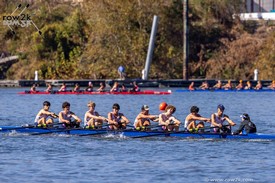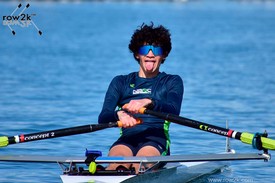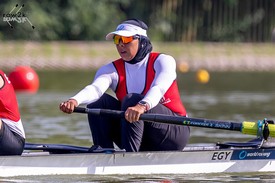Our modern word cybernetics derives from the Greek word for coxswain -- kybernetes -- which means one who directs. In the Athenian navy, the Kybernetes (helmsman) was second in command to the Trierarchos (Captain of a trireme).
The navy was the junior service in Athens. It was more accessible to the common citizen than the Army, membership in which required a certain amount of wealth to afford armor. The main piece of equipment a rower needed was a hyperesion (let's translate that as "buttpad"), a cushion made of leather which probably slid back and forth on the bench. (Stephen Kiesling's The Shell Game discusses the evidence that the Athenians rowed with sliding pads, which may have given them an advantage over the Persians, whose seats were fixed.)
A kybernetes' naval career began as rower, then advanced to prorates ("lookout" -- derived from the same words from which we get "prow" and "bow"). The proratai also handled the steering oars under the kybernetes' direction. Linguistically, the term prorates suggests that the bow oars -- which were probably longer than the others -- may have also had a role in maneuvering the ship. After learning the technical aspects of celestial navigation and ship handling, the prorates moved up to become a kybernetes. In addition to responsibilities as helmsman, the kybernetes supervised the operation of the ship; relayed the Trierarchos' orders to the rest of the crew (via the proratai), and was in part financially responsible to the Athenian State for the condition of the vessel. The fine levied against any kybernetes who improperly beached a ship was 1,000 obol!
Directed by the kybernetes, the keleustes directed the rate and timing of the oars. The cadence was maintained by the trieraules with a flute (i.e. probably something like a boatswain's whistle). There are accounts that Alcibiades -- whose competence as an admiral was second only to his flamboyance -- employed a famous tragic actor aboard his flagship as trieraules. (Somehow, I just can't picture weeping down the middle thousand metres to lines from Aeschylus or Sophocles. "Ten for Clytemnestra!" "Antigone ratio shift!" "Oedipus, eyes OUT on this one.") Athenian triremes also carried pentekontarchoi (3 per ship) each in charge of a bank of fifty oars (a Stroke for each bank), and even a kopodetas, who was a specialist in fitting the oars to the oarlocks.
Like the kybernetai, the trierarchoi were held financially responsible for damages -- except from storms -- to the ships under their command. ("That's not a rigger ding, a Persian ship rammed me, I swear!"). Trierarchoi had to sign their ships out of the arsenal and return them to the State in good condition. This sometimes meant the heavy personal expense of having to refit ships both prior to, and after, a naval expedition. The leaders of the Assembly were often accused of deliberately assigning their political rivals to command ships in poor condition. There are court records of Trierarcoi suing to recover the cost of the sails, which apparently were prone to rot in storage.
Regattas involving warships were a part of religious festivals, at home and abroad, and trireme races -- often on the high sea -- were a standard part of naval training. Some admirals even made their crews race to the shore for mealtimes -- those who arrived first got to eat first and had more rest time. Crews drilled the precise tactical maneuvers required in battle: the periplous (a post-ramming spinning maneuver to back out and bring the ship alongside for boarding), the diekplous (closing rapidly alongside to break enemy ships' oars -- a tactic still in favor with some crews at the Head of the Charles), and the kyklos (which probably involved aligning the ship for shooting arrows and other missiles. "Keep the boat set!"). In 494 BC, the rigours of training for the diekplous so strained the patience and endurance of the Ionian crews that, after seven days, they refused to continue with the training. Unfortunately for the Ionians, their enemies kept practicing and used the diekplous to great effect at the subsequent battle of Lade, where the Ionians lost badly.
For more about rowing a trireme, or information about the reconstructed trireme Olympias, there is the Trireme Trust website.
If you enjoy and rely on row2k, we need your help to be able to keep doing all this. Though row2k sometimes looks like a big, outside-funded operation, it mainly runs on enthusiasm and grit. Help us keep it coming, thank you! Learn more.
- Bont Rowing
- Calm Waters Rowing
- Concept 2
- Craftsbury Sculling
- The Crew Classic
- CrewLAB
- Croker
- Durham Boat Co.
- Empacher
- Faster Masters
- Filippi
- Fluidesign
- h2row.net
- HUDSON
- Live2Row Studios
- Nielsen-Kellerman
- Oak Ridge RA
- Peinert Boat Works
- Pocock Racing Shells
- Race1 USA
- RowKraft
- Rubini Jewelers
- Vespoli USA
- WinTech Racing
- Bont Rowing
- Calm Waters Rowing
- Concept 2
- Craftsbury Sculling
- The Crew Classic
- CrewLAB
- Croker
- Durham Boat Co.
- Empacher
- Faster Masters
- Filippi
- Fluidesign
- h2row.net
- HUDSON
- Live2Row Studios
- Nielsen-Kellerman
- Oak Ridge RA
- Peinert Boat Works
- Pocock Racing Shells
- Race1 USA
- RowKraft
- Rubini Jewelers
- Vespoli USA
- WinTech Racing

















